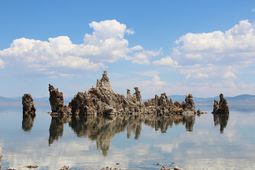Difference between revisions of "Lake Heshov"
Jump to navigation
Jump to search
Yrieixgroulx (talk | contribs) (Created page with "{{Infobox body of water | name = {{subst:PAGENAMEBASE}} | native_name = Kesh Heshov | native_name_lang = Algaz | other_name = | image...") |
Alynnidalar (talk | contribs) |
||
| Line 64: | Line 64: | ||
'''Lake Heshov''' is a large, extremely saline lake located in the [[Algazi Union]]. Known for its salt-encrusted tufa rock formations, the lake is an important tourist destination, particularly for Algazi visitors. Lake Heshov has historically had a great deal of religious significance for the Algazi; salt from the lake is valued for its apotropaic properties, though collection is highly limited due to the lake's protected status. | '''Lake Heshov''' is a large, extremely saline lake located in the [[Algazi Union]]. Known for its salt-encrusted tufa rock formations, the lake is an important tourist destination, particularly for Algazi visitors. Lake Heshov has historically had a great deal of religious significance for the Algazi; salt from the lake is valued for its apotropaic properties, though collection is highly limited due to the lake's protected status. | ||
[[Category:Algazi_Union]][[Category:Lakes]] | [[Category:Algazi_Union]][[Category:Lakes]][[Category:Lakes in Baredina]] | ||
Revision as of 03:25, 19 April 2016
| Lake Heshov Kesh Heshov | |
|---|---|
 Tufa formations near the lake's northern shore | |
| Location | |
| Type | Endorheic |
| Primary inflows | seasonal streams |
| Primary outflows | evaporation |
| Catchment area | 180,559.47 km2 (69,714.40 sq mi) |
| Surface area | 1,332.16 km2 (514.35 sq mi) |
| Max. depth | 34 m (112 ft) |
| Water volume | 6.2 km3 (5,000,000 acre⋅ft) |
| Salinity | 68 g/L |
| Shore length1 | 195.73 km (121.62 mi) |
| 1 Shore length is not a well-defined measure. | |
Lake Heshov is a large, extremely saline lake located in the Algazi Union. Known for its salt-encrusted tufa rock formations, the lake is an important tourist destination, particularly for Algazi visitors. Lake Heshov has historically had a great deal of religious significance for the Algazi; salt from the lake is valued for its apotropaic properties, though collection is highly limited due to the lake's protected status.